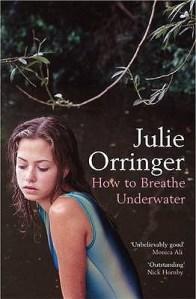
In ?The Smoothest Way Is Full of Stones,? the failure of religious and moral codes?to protect, to comfort, to offer solace?is seen through the eyes of a group of Orthodox Jewish adolescents discovering the irresistible power of their burgeoning sexuality. Ai-ee-duh: two cries of pain and one of stupidity?). In ?When She Is Old and I Am Famous,? a young woman confronts the inscrutable power of her cousin?s beauty (?Aïda.

In ?The Isabel Fish,? the sole survivor of a drowning accident takes up scuba diving. In ?Pilgrims,? a band of motherless children torment each other on Thanksgiving day. All of them learn, gloriously if at great cost, how to breathe underwater. Julie Orringer?s characters?all of them submerged by loss, whether of parents or lovers or a viable relationship to the world in general?struggle mightily against the wildly engulfing forces that threaten to overtake us all. Nine fiercely beautiful, impossible-to-put-down stories from a young writer who has already received immediate worldwide attention.

But though her subjects may take us to the murky depths-submerging us in the cruelties girls and siblings commit against each other-Orringer's nimble writing and subtle humor allow us to breathe. Orringer possesses an acute understanding of the many rules of girlhood, in particular the uniquely childish importance of "not telling" (for fear of becoming a traitor, and consequently, an outcast). To Ella it seemed they could be relatives of her mother's, shameful cousins recently discovered." Shame is as omnipresent as water in this collection, sadly appropriate for stories about girls becoming women. In "Pilgrims," young Ella is taken to a hippie household for Thanksgiving, where her mother joins several other cancer patients in search of natural remedies: "Some of them wore knitted hats like her mother, their skin dull-gray, their eyes purple-shaded underneath. The author possesses an uncanny ability to capture scenes and complex emotions in quick strokes. A fall from a treehouse, an ailing mother, a near-drowning, a premature baby, a gun-each is the source of a young woman's coming-of-age, which we witness through Orringer's lovely, driving prose.

The stories in How to Breathe Underwater, Julie Orringer's debut collection, swim with tragedies both commonplace and horrific.


 0 kommentar(er)
0 kommentar(er)
